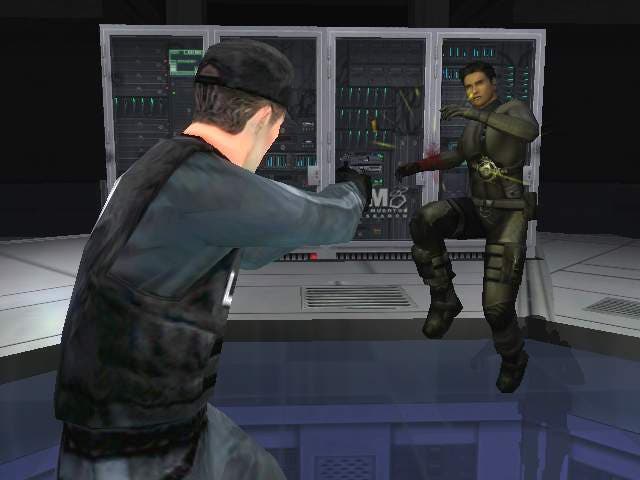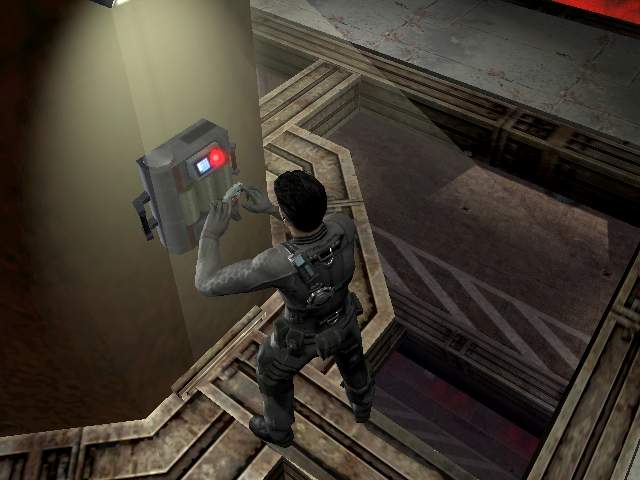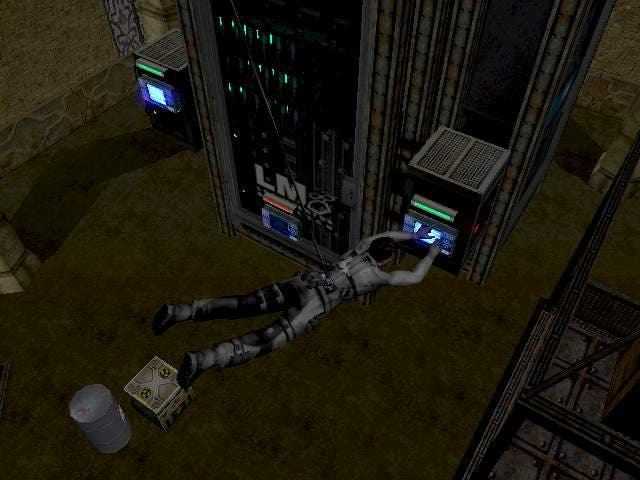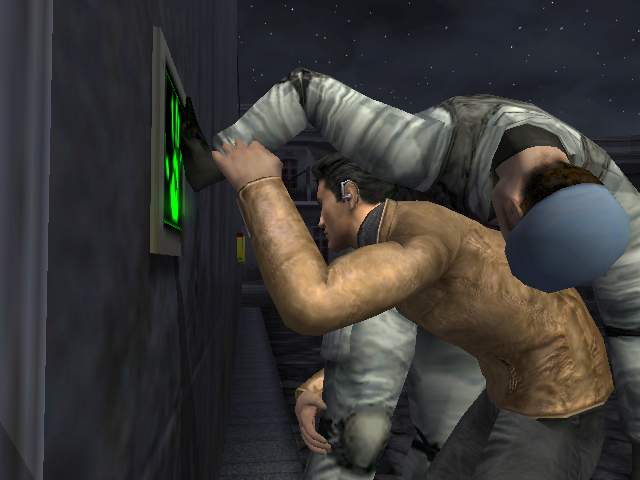Mission: Impossible - Operation Surma
Operation: Make a Splinter Cell clone.
Picture, if you will, the boardroom tussles between Paradigm Entertainment and Atari. The stony-faced Atari exec deadpans over a mahogany table, fully 30 feet across the sterile, blacked out air-conditioned nightmare. "Your mission, should you choose to accept it, is to play Splinter Cell, copy its gameplay, mission structure, animation, look and feel and deliver us a game allows us to make use of the expensive Mission Impossible licence we've acquired."
"Roger that, sir" the Paradigm exec nods, "with Tom Cruise on board we'll have a game to truly maximise the revenue potential of such an established franchise."
"No dice" spits Mr Atari. "Cruise wasn't part of the deal - you have to make a generic version of Ethan Hunt - but makes sure he's an exceptionally competent agent in peak physical condition, motivated by a desire for justice and a passion for danger. Oh, and he's a master of impersonation. He's so convincing you'd be sure it was Cruise, right there on your screen, barking at you for focusing too much on his big beak."
"But, but, you managed to get Arnie for Terminator 3 and Will Smith's bird for Enter The Matrix. How come we've get the shitty end of the stick?"
"That's classified information. I'm not at liberty to discuss these matters with you," Mr Atari barks sternly, and exits the room, flanked by bulldozer bodyguards.
And with that our Paradigm exec shuffles off stealthily into the stark concrete night, mindful of the strict brief to nuzzle up to Sam Fisher for a few months and begin the process of moulding an M:I game around Ubisoft's successful hide and sneak formula.
Georgulariaslavistan

Fast forward to the present day and we have in our hands the finished box copy of M:I - Operation Surma on Xbox - a game so shrouded in secrecy that no other publication in the world has even reviewed it yet, always a telling sign of a publisher's total lack of confidence in the relative merits of a product. But unlike the frankly despicable Rise of the Machines, these well-founded fears over Atari's latest movie-related disaster-to-be are dispelled within a matter of minutes in the company of this respectable, albeit by-the-numbers stealth action title.
As you'd perhaps expect for a title that shamelessly borrows rather than innovates, the whole premise is typically stereotypical in a damn-those-pesky-Eastern-Europeans kind of way. Kicking off with a battle against a shady organisation known as SURMA, the operation commences in (no giggling at the back) Yulgaria, with our IMF hero Ethan Hawke, sorry, Hunt, tasked with saving the Western world from having its weapons secrets pinched by the sneaky Ice Worm computer virus.
Soon SURMA realises its plot is being compromised and so the game quickly develops into a high tech covert tussle between good and evil aided and abetted by your hacking cohort Luther Stickell, who provides the mission updates and technical backup, while the buccaneering Billy Baird also chips in when the stakes are high.
The initial impressions of being a Splinter Cell clone are well founded from the off; Hunt moves just like Fisher, has an almost identical repertoire of moves to Fisher, while the hide-in-the-dark guard whacking, computer hacking, security system disabling gameplay is similarly hewn from the same exacting, stubborn rock as the Ubisoft classic. Don't come around these parts looking for new ideas, fair adventurer.
An expert in repetition

As you might expect for a game that prides itself on being covert, it's a given that you're going to have to tolerate messing things up. It's a job requirement that you'll spend a great deal of time replaying the same sections over and over again until you work out the guard paths, the camera layouts, the positions of the switches and the correct usage of the various gadgets. All the usual boxes are checked, and on that basis it comes across as a solid attempt to shoehorn the M:I brand into the ever-popular stealth action genre. For those with a short attention span or a tendency to get pissed off with gameplay repetition, it's fair to say that this won't be for you, but if you warm to sneak fests and enjoy a solid slice of steady-paced stealth foolery, it has a fair bit going for it.
Any stealth game worth its bandanas has an array of sneaky gadgets, and Operation Surma offers a few genre staples to deliver a sense of familiarity, along with a few of its own for good measure. Within the first portion of the first level you're basically given a quick tutorial with all of them, with the Tranq Gun perhaps the most essential staple in your arsenal. Like any dart gun, it incapacitates many an irritating foe in seconds and is guaranteed to get you out of many a scrape, as stealth attacks aren't always possible when you're legging it and attempting to reset yet another tripped alarm.
Almost as crucial is the Electronic Warfare Gun, a gun that fires out camera disabling darts, as well as allowing you to track an enemy's position. Other standard gadgets include the Laser Cutter, which allows you to carve your way through certain doors, the Micro Cord, a winch-firing marvel that allows you to pull yourself up to handily placed pipes, sneak through otherwise impassable areas and perform overhead stealth attacks on unwary guards, as well as the Remote Camera Viewer (check out those security camera feeds), the Sonic Imager (see through doors and walls), Digital Binoculars (zoom in on enemies, listen in on their conversations, upload pictures for disguises, and so on), as well as the obligatory night vision and lock pick.
Yes! Something it's better than Splinter Cell at!

The control set up makes it a relative doddle to cycle through the available commands on the D-pad, with all the relevant commands sensibly mapped and easily accessible. Unlike the original Splinter Cell, you won't be all fingers and thumbs while you work out which obscure combination to pull off.
The basic game design is fairly solid until you come across some of the more irritating flaws that regularly crop up and bar your progress. In the main, the game follows a set framework to abide by - disable the cameras, take out the patrolling sentries, hack computer X, move onto next area. But in just about every single section of the game there's one exceptionally minor stumbling block that crops up to frustrate the life out of you. If it's not a camera that you've yet to discover, or an obscure switch you haven't chanced upon, it's that there's a particular object you haven't spotted yet.
The main problem is the mission briefings and objectives, which are at best vague, and at worst totally unhelpful. While it makes the gameplay quite open ended (i.e. you don't have to take out all the cameras to progress, but it helps), the upshot is that you'll regularly spend ages just wandering around like a headless chicken clicking on every part of the scenery in the vain hope that it does something useful. On one occasion, we were stuck for well over an hour before we finally realised there was a part of the scenery we could use our Micro Cord on. In other games it would be patently obvious what to do, but so often Operation Surma gives the vaguest clues and has you convinced half the time that the game's bugged, when it transpires that it's just being unhelpful.
Caution: Explicit language

We're not advocating the gaming equivalent of hand-holding by any means, but after about the seventh level you just get increasingly fed up with having to work around the designers' laziness and refusal to even drop the slightest hint as regards what to do. For example, on the latter part of the second mission you have to engage in the first trademark Mission: Impossible moment, getting one of those latex facial disguises and then winching yourself up to the ceiling to hack into a giant floor to ceiling computer, with 90 seconds to swing yourself into position and grab the data from five different drives.
Initially it seems like a good movie-style moment, and exactly the kind of tension inducing moment. That is, until you're replaying the section for the 20th time, cursing the poor collision detection that refuses to acknowledge when you're lined up right in front of the exact drive and causes you to fail yet again. Of course, we managed it in the end, in the small hours of the night, but it didn't feel like fun, it just wound us up into a torrette tornado until we finally squeaked through to the next equally frustrating section. And as any weary gamer will note, there's only so many times you're prepared to be beaten over the head inexplicably before you hit the eject button for the last time and it goes back to the shop.
And not content with being a less exciting version of Splinter Cell, it compounds its inferiority by dressing the game up with a less than stellar graphics engine that can't hold a candle to Ubisoft's lighting extravaganza. The character models are certainly reasonably commendable with some decent animation and respectable detailing, but the environments lack anything approaching a next-gen sheen with bland texturing, an uninspiring colour scheme and an almost total lack of lighting and particle effects to help draw you in. Add to that some really basic AI routines that really make you appreciate the subtlety in Metal Gear and Splinter Cell, throw in the inanely-respawning-guard syndrome and you end up with a game that screams "Average!" from every pore.
Which makes our job a bit easier...
Operation Surma isn't a bad game by any means. A generation ago this would've been held up as a fine game, but it's been radically usurped in almost any area you care to mention, and in this day and age just slapping a licence on the front of the pack isn't enough to make it anywhere near interesting. Taking away the official element of real movie stars, exclusive clips and all the ballyhoo that hysterically surrounds these titles isn't necessarily a bad thing, but it doesn't help it either, especially when we've seen the likes of EA showing how it should be done recently. Another case of 'licenced game in mediocreshock', then. Thank goodness for 10-day returns policies, eh?

